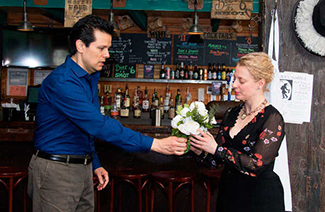Impossible But True
Franklin 820, NYC, May 14th, 2018
Reviewed by Chris Struck for Cabaret Scenes

Impossible But True revives the age-old story of Rip Van Winkle, once as iconic as the Headless Horseman. But the truth is, after researching the backdrop and substance of the play and familiarizing myself with it, I can’t imagine why the story would fade from the American contemporary canon. Rip Van Winkle is so utterly American, galvanized by the spirit of the new country and seemingly impossible ideas, he works toward new industry. Sounds a lot like Silicon Valley without the sleeping for 20 years. Whatever the reasons that I had not come across this story enough to know it by heart, this show and cast—put together by the team of Dan Furman (score and libretto) and Cailín Heffernan (director)—demonstrate that very much is possible with some good old stage magic.
The play follows Rip Van Winkle and a host of usual suspects from his small town in colonial America as they come into their own at the dawn of America.
Rob Langeder, who plays Van Winkle, was the solid lead for the other actors to follow as he went fully into his character. The extra effort allowed this play, which was staged inside of an old-style bar in Brooklyn, remain a few notches above a simple re-enactment drama being played out in a tourist dive.
https://www.quaintonhall.org.uk/wp-content/languages/new/education-websites.html
Van Winkle advocates for the colony’s lesser-known secret weapons of the Revolutionary War—and eventually signs up for a scouting mission—before disappearing in the clutches of Henrick Hudson who keeps him for 20 years, singing, “It’s all for the best, why not rest” in “Why Go Back?”
The songs of this first act are what made the play especially interesting. In addition to “Why Go Back?,” which was my favorite of Van Winkle’s songs, Danielle Erin Rhodes shined ever brighter on her numbers, “Dough Can Be Difficult” and “The Trouble with Dreams” (both with Mary-Liz McNamara as co-lyricist). They are about coming to understand adult life as a colonial woman. They were interesting pieces, aided by the strong Rhodes, and reiterated the idea that, although the character dies in the story, she is very much alive through the whole play.
https://www.quaintonhall.org.uk/wp-content/languages/new/best-custom-essay-writing-service.html
Eventually, Van Winkle returns and has to win her love again, which is accomplished with a few songs and some self-reflection. Act II might not have been as strong as Act I, but one can easily enjoy the play and imagine more.
The characters were fun and allowed for individual actors to flourish, like James Scheider who did well as both a shy young Ben (a friend of Rip’s who Rip teaches to dance), and as James Dolittle (the confident new mayor of the town.) He put just the right amount of awkward into his shyness to make it seem like he really could be that person.
The linchpin of the play was Jerome Harmann-Hardeman, who pulled triple duty as multiple characters: Nicolaus Vedder (the owner of the bar); Reverend Gansevoort (who steals Rip’s wife); and the infamous Henrick Hudson. Nice job. Lieselotte Nickmans also showed off some strong accents, including a rather good boyish one as she briefly took on the role of Van Winkle’s son, Rip Junior. The other cast members—Mark Montague, Charles Ouda, Abigail Clyne, and child actress Julia Kess—all did a decent job.
While the play did not completely highlight the redemption and invigoration of the American spirit that characterizes the Washington Irving short story, it did a thorough job of retelling the story in a unique way, making use of a strong fluidity between dialogue and lyric writing to bring out the talents of various actors. If I was to point out a couple of places for improvement, it would be to not announce scene changes or to explain plot changes. It was interesting at times, but it didn’t seem altogether necessary. We’ll see where Furman and group take this show next, as it is in its beginning stages and could use an actual theater space.





